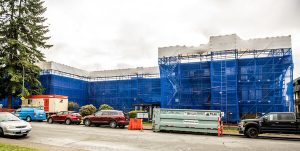
Metro Vancouver Housing’s 1972 apartment building in North Vancouver is one of four buildings and 20 single-family homes undergoing a deep energy-efficiency makeover as part of a FortisBC pilot project aimed at lowering energy use in older buildings by half or more. (CNW Group/FortisBC)
SURREY – Fortis BC is doing deep energy retrofits on 20 older buildings to reduce emissions and energy costs for consumers by half or more in a new $50 million project.
Fortis BC is starting with Manor House, a three-level, 50 unit apartment building constructed in 1972 in North Vancouver, which is projected to reduce GHG emissions by 66 percent and energy usage by 56 percent. The information gained will be invaluable for industry, policymakers and FortisBC to determine how best to ensure older housing units can continue to meet the needs of families as the province moves towards a net-zero future.
“To our knowledge, this is the largest targeted, real-world study of deep energy-efficiency upgrades in B.C. homes and the information will be invaluable to us and others looking to transform energy use,” said Joe Mazza, vice president, energy supply and resource development, FortisBC. “Determining the most effective path to greatly lower energy use in older homes is a critical way we can help lower emissions while helping customers save money on energy costs.”
Buildings account for just over 10 per cent of B.C.’s greenhouse gas (GHG) emissions. To address this, the Province of B.C. has set a target of lowering GHG emissions in the building and communities sector by 59 to 64 per cent of 2007 levels by 2030. Older homes and apartment buildings pose a complex challenge to achieving those targets because a significant number across B.C. were built before energy efficiency was incorporated into the National Energy Code for Buildings in 1997.
“Metro Vancouver Housing has set targets to cut greenhouse gas emissions from our buildings by 45 per cent (from 2010 levels) over the next 10 years and significantly bring down energy consumption through rehabilitation projects. Reducing emissions from buildings is one of the main ways that Metro Vancouver will reach its goal of becoming a carbon neutral region by 2050,” said George V. Harvie, chair, Metro Vancouver Board of Directors.
Energy efficiency is a key pillar of FortisBC’s goal to lead the clean energy transformation in B.C.
“As we evolve our energy-efficiency programs, we’ll be able to undertake deeper energy retrofit projects that are more complex, intensive and comprehensive than what’s supported today through traditional energy conservation programs and rebates,” added Mazza. “It will allow us to realize energy efficiencies with home and building owners in ways that might have been out of reach before.”
The current pilot takes an envelope-first approach, improving the building envelope (outer shell) to prevent heat loss and reduce heating demand. This includes upgrades to walls, windows, doors and insulation. Each home and building will also have its space heating, domestic hot water and ventilation systems upgraded to be as energy efficient as possible. This includes installing new gas heating technologies like dual-fuel hybrid systems or gas heat pumps that have achieved efficiencies of more than 100 per cent in manufacturers’ testing, and determining if this can be replicated in real-word settings.
Business Examiner Staff


